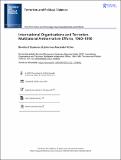Files in this item
International organisations and terrorism : multilateral antiterrorism efforts, 1960-1990
Item metadata
| dc.contributor.author | Blumenau, Bernhard | |
| dc.contributor.author | Müller, Johannes-Alexander | |
| dc.date.accessioned | 2021-07-29T11:30:14Z | |
| dc.date.available | 2021-07-29T11:30:14Z | |
| dc.date.issued | 2023-03-01 | |
| dc.identifier | 274461960 | |
| dc.identifier | 5b73f5dc-7992-4978-be16-b0d5a95d32ba | |
| dc.identifier | 85111455307 | |
| dc.identifier | 000679064800001 | |
| dc.identifier.citation | Blumenau , B & Müller , J-A 2023 , ' International organisations and terrorism : multilateral antiterrorism efforts, 1960-1990 ' , Terrorism and Political Violence , vol. 35 , no. 2 , pp. 433–451 . https://doi.org/10.1080/09546553.2021.1938002 | en |
| dc.identifier.issn | 0954-6553 | |
| dc.identifier.other | ORCID: /0000-0003-1072-3512/work/97885405 | |
| dc.identifier.uri | https://hdl.handle.net/10023/23675 | |
| dc.description.abstract | This article examines early antiterrorism negotiations within international organisations (IOs) and their outcomes. It assesses how international cooperation emerged in specialised, regional, and global IOs and provides a long-term overview from the 1960s until the late 1980s. Drawing on primary sources and scholarly literature, this article identifies the patterns, trends, and key characteristics of the successfully adopted measures. It demonstrates that early multilateral antiterrorism efforts faced several obstacles (sovereignty, national interests, mistrust, and geopolitics), and, therefore, international negotiations fared better when following a piecemeal approach within specialised or regional organisations, where the focus could be on specific aspects of terrorism (e.g., hostage-takings). A key characteristic of the successfully adopted antiterrorism instruments was the aut dedere aut iudicare principle, which allowed states to maintain perceptions of sovereignty by either extraditing or trying a suspect. The antiterrorism efforts examined here were mostly preventative in design and worked to discourage future terrorists by ensuring that safe havens were closed and that perpetrators faced justice. The shift to suicide terrorism in the 1990s would instead require new international antiterrorism efforts to focus on pre-emptive strategies, depriving terrorists of the means to carry out attacks. The roots of these measures were laid in the 1980s. | |
| dc.format.extent | 19 | |
| dc.format.extent | 675083 | |
| dc.language.iso | eng | |
| dc.relation.ispartof | Terrorism and Political Violence | en |
| dc.subject | International organisations | en |
| dc.subject | Terrorism | en |
| dc.subject | Multilateral cooperation | en |
| dc.subject | Antiterrorism | en |
| dc.subject | Extradition | en |
| dc.subject | United Nations | en |
| dc.subject | JZ International relations | en |
| dc.subject | T-NDAS | en |
| dc.subject | SDG 3 - Good Health and Well-being | en |
| dc.subject | SDG 16 - Peace, Justice and Strong Institutions | en |
| dc.subject | MCC | en |
| dc.subject.lcc | JZ | en |
| dc.title | International organisations and terrorism : multilateral antiterrorism efforts, 1960-1990 | en |
| dc.type | Journal article | en |
| dc.contributor.institution | University of St Andrews. The Handa Centre for the Study of Terrorism and Political Violence | en |
| dc.contributor.institution | University of St Andrews. Centre for Global Law and Governance | en |
| dc.contributor.institution | University of St Andrews. School of International Relations | en |
| dc.identifier.doi | 10.1080/09546553.2021.1938002 | |
| dc.description.status | Peer reviewed | en |
| dc.date.embargoedUntil | 2021-07-26 |
This item appears in the following Collection(s)
Items in the St Andrews Research Repository are protected by copyright, with all rights reserved, unless otherwise indicated.

